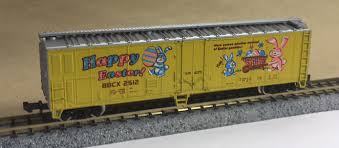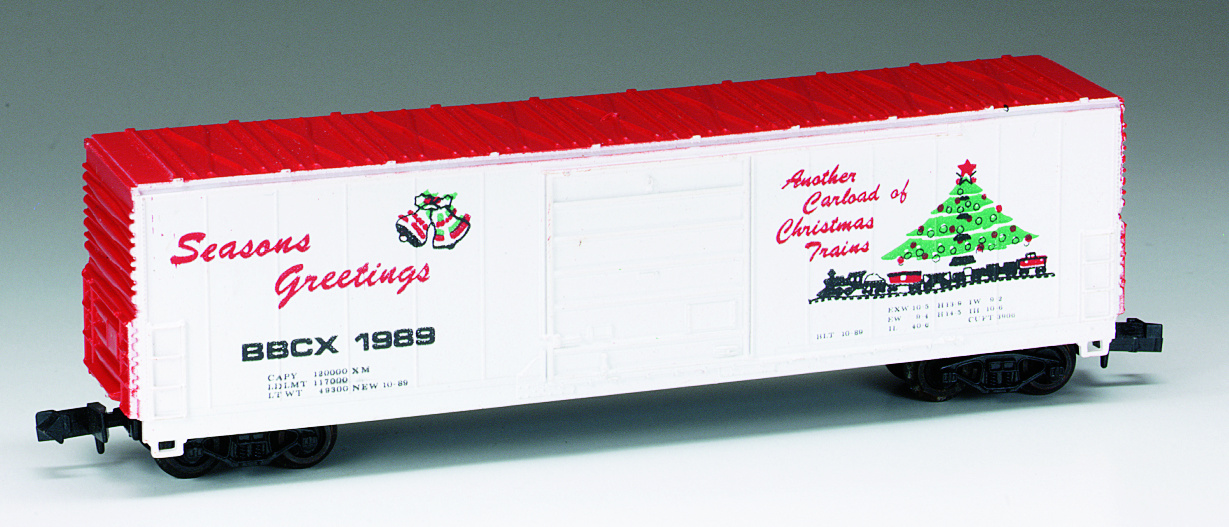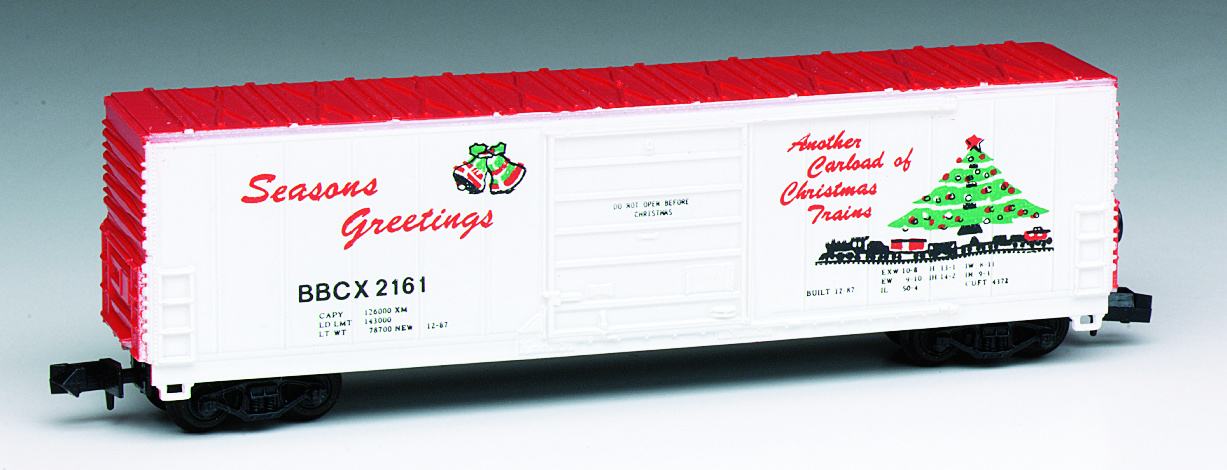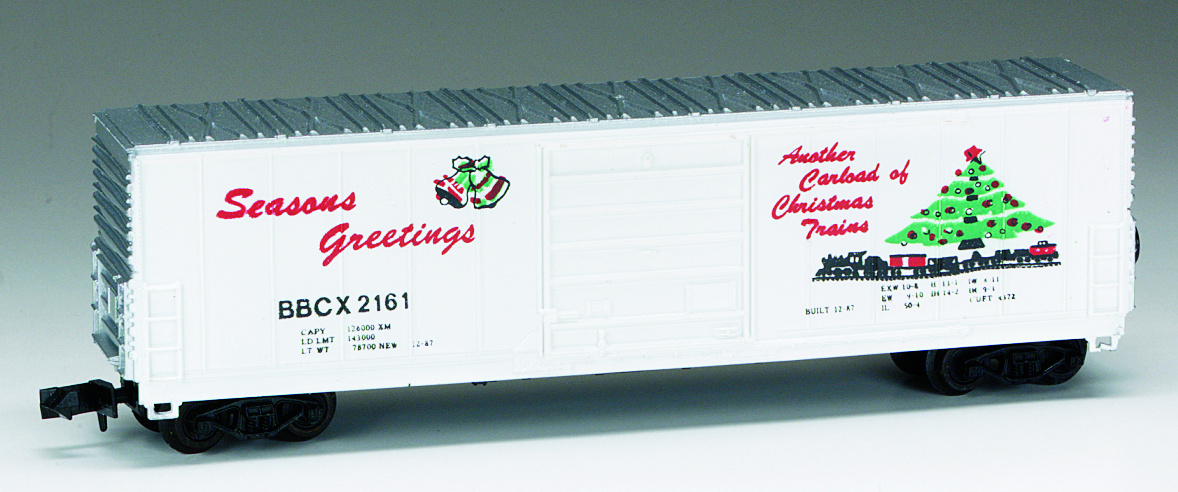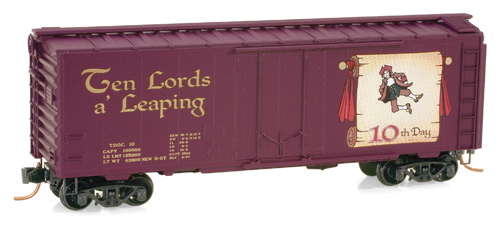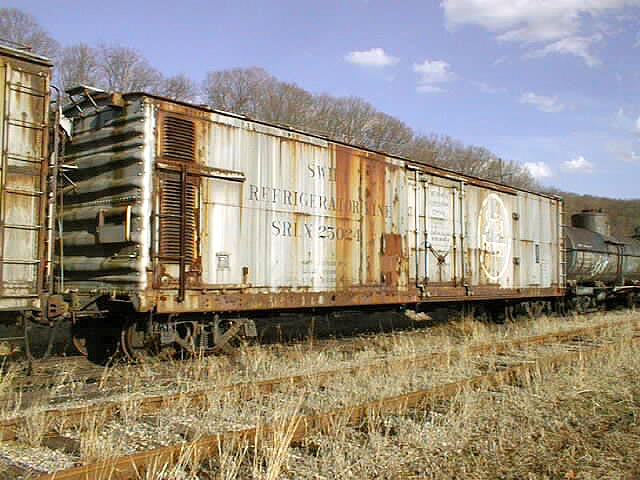Model Information: Apparently dissatisfied with the Roco-produced 50 foot mech reefer from 1969, Atlas made a completely new tooling in 1975. This new version featured riveted sides (the Roco version had rib sides). The tooling was moved to China in the 1990s along with all their other molds and production. By December 2006, this tooling was a bit long in the tooth and Atlas reclassified the model and continued production under the Trainman® line.
Four of the early reefers in this sequence (3241, 3242, 3243 and 3244) do not seem to appear in any of the 1970s Atlas catalogs, but they definitely exist. Apparently Atlas was having some serious numbering issues with these reefers. The first four 3241..3244 (at least I think they were the first four) were assigned MPN's that had already been used for their Shorty Tank cars. Then they mis-numbered the 1978 catalog listings as 3551... which apparently was a catalog error, because no such reefers exist. Atlas finally settled on 3651... which is what *most* of the earliest releases used (the original 4 being the exception) and the 1980 catalog is corrected to reflect this. We believe the date of production for these cars was 1975.
This model was also repainted by several of the aftermarket redecorators including Aksarben and Bev-Bel.
Four of the early reefers in this sequence (3241, 3242, 3243 and 3244) do not seem to appear in any of the 1970s Atlas catalogs, but they definitely exist. Apparently Atlas was having some serious numbering issues with these reefers. The first four 3241..3244 (at least I think they were the first four) were assigned MPN's that had already been used for their Shorty Tank cars. Then they mis-numbered the 1978 catalog listings as 3551... which apparently was a catalog error, because no such reefers exist. Atlas finally settled on 3651... which is what *most* of the earliest releases used (the original 4 being the exception) and the 1980 catalog is corrected to reflect this. We believe the date of production for these cars was 1975.
This model was also repainted by several of the aftermarket redecorators including Aksarben and Bev-Bel.
Prototype History: The purpose of a mechanical reefer is to keep perishable items cold. Early reefers were of all wood construction and used ice for cooling. By the 1940s, new reefers were being built entirely of steel. Insulating techniques improved to the point where economical refrigeration could be accomplished using steel side plates in place of wood sheathing. Fifty foot mechanical reefers date back to at least the late 50s / early 60s.
The mechanical reefers could keep a more regular temperature, and often times colder than what the ice bunker cars were capable of. Initially mechanical reefers were used primarily in frozen food service. This would soon change as mechanical refrigeration began to replace ice-based systems. Soon after, mechanical refrigeration units replaced the “armies” of personnel required to re-ice the cars.
The first record of a 50' mechanical refrigerator car with a 6' plug door appears in the October 1954 Official Railway Equipment as with reporting marks FGEX 1000 - 1100. The January 1958 Official Railway Equipment Register lists over 600 of these cars. They appear with road numbers between 1000 and 1600. The build dates will fall between these two dates.
They were first acquired for orange juice service out of Florida. Similar cars were owned by WFEX and BREX. All were used in pool service with one another, depending upon the season. You can find a remaining prototype preserved in the NC Transportation Museum in Spencer, NC.
The mechanical reefers could keep a more regular temperature, and often times colder than what the ice bunker cars were capable of. Initially mechanical reefers were used primarily in frozen food service. This would soon change as mechanical refrigeration began to replace ice-based systems. Soon after, mechanical refrigeration units replaced the “armies” of personnel required to re-ice the cars.
The first record of a 50' mechanical refrigerator car with a 6' plug door appears in the October 1954 Official Railway Equipment as with reporting marks FGEX 1000 - 1100. The January 1958 Official Railway Equipment Register lists over 600 of these cars. They appear with road numbers between 1000 and 1600. The build dates will fall between these two dates.
They were first acquired for orange juice service out of Florida. Similar cars were owned by WFEX and BREX. All were used in pool service with one another, depending upon the season. You can find a remaining prototype preserved in the NC Transportation Museum in Spencer, NC.
Road Name History:  In the United States, "happy holidays" (along with the similarly generalized "season's greetings") has become a common holiday greeting in the public sphere of department stores, public schools and greeting cards. Its use is generally confined to the period between United States Thanksgiving and New Year's Day. The phrase "happy holidays" has been used as a Christmas greeting in the United States for more than 100 years.
In the United States, "happy holidays" (along with the similarly generalized "season's greetings") has become a common holiday greeting in the public sphere of department stores, public schools and greeting cards. Its use is generally confined to the period between United States Thanksgiving and New Year's Day. The phrase "happy holidays" has been used as a Christmas greeting in the United States for more than 100 years.

Brand/Importer Information:  Formerly located in Cresskill, New Jersey, the now defunct Bev-Bel Corp. was founded by the late Irvin and Beverly Belkin in 1956. A prolific "boutique" producer of after-market, limited production, special run rolling stock and locomotives (in road names and non-traditional commemorative and holiday themed paint schemes that were not typically offered by the major manufacturers), Bev-Bel' sourced its models from Atlas Tool Co., Inc., Atlas Model Railroad Co., Inc., Bachmann, and Life-Like Trains.
Formerly located in Cresskill, New Jersey, the now defunct Bev-Bel Corp. was founded by the late Irvin and Beverly Belkin in 1956. A prolific "boutique" producer of after-market, limited production, special run rolling stock and locomotives (in road names and non-traditional commemorative and holiday themed paint schemes that were not typically offered by the major manufacturers), Bev-Bel' sourced its models from Atlas Tool Co., Inc., Atlas Model Railroad Co., Inc., Bachmann, and Life-Like Trains.

Manufacturer Information: 'Atlas Model Railroad' represents the New Jersey manufacturing facility for Atlas brand model railroad products. Atlas also imported European made models in their early years and those items will be noted as having manufacturers set appropriately. In the 1990s Atlas moved all their toolings to China.
Item created by: gdm on 2018-03-21 11:23:18. Last edited by gdm on 2020-05-27 18:44:43
If you see errors or missing data in this entry, please feel free to log in and edit it. Anyone with a Gmail account can log in instantly.
If you see errors or missing data in this entry, please feel free to log in and edit it. Anyone with a Gmail account can log in instantly.


